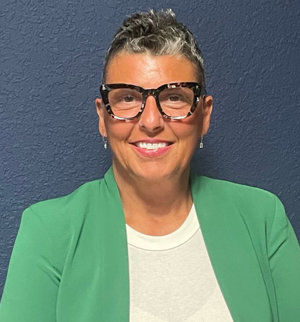Sisterhood Spotlight

Advocate for surviving families of Public Safety Officers
Determined to honor her husband, Chesapeake Police Officer William “Will” D. Whisenant’s legacy, Trisha has become an advocate for surviving families of public safety officers. She works with leaders to improve policies and procedures so others don’t have to fight for what they deserve. Believing that no one should endure what her family did, she is dedicated to changing the culture around mental health and wellness for public safety officers and their families. Stepping into the spotlight, Trisha aims to be a beacon of hope for those facing their darkest days, carrying forward Will's legacy and advocating for necessary support and change.
As the wife of Chesapeake Police Officer William "Will" D. Whisenant for 25 years and the mother of his two children, what motivated you to step into advocacy work after his passing?
Will's death needed to matter, and something positive had to come from it. The obstacles we've had to endure, and are still enduring, just to obtain the benefits we deserve, must be drastically streamlined. Only recently have the deaths of Public Safety Officers by suicide been added to policies for eligible benefits at the state and federal levels. However, the procedures for handling these cases to gain approval for those benefits are still inadequately documented. Surviving families like ours should not have to navigate this broken process only to face denial. My hope is to work with our leaders to change these policies and procedures so that other families don't have to add "fighting for line of duty benefits" to their list of challenges.
In what ways has stepping into the role of advocate and voice for surviving families helped you honor your late husband Will's legacy and positively impact the lives of others?
Will dedicated his life to improving the lives of others, always giving what was needed to make their lives better, richer, and more fulfilling. He was at his best when he was helping others in their worst moments. By thinking of how other families are affected and working to help them, I honor him. If I can change even one thing to help families like ours, it keeps his legacy alive and has a positive impact on others.
How have your personal experiences and resilience shaped your approach to driving change, and what advice would you offer to others facing similar challenges?
I've always been tough and resilient, growing up as a tomboy taught me to keep going when times get tough. To never let things keep you down, keep getting up, and never stop fighting, even when it feels impossible. This isn't just about my husband Will, myself, or our children; it's about all the families who came before us and those who will come after us. My advice to others is to not let anyone dictate how you should think or feel, or what you should or shouldn't do. Grief is necessary and essential. Continue to process and heal, but don't let it define you. Never be ashamed or afraid to ask for help for yourself, your family, or for navigating the challenges of obtaining the benefits you deserve. No one should have to face this alone.
What resources do you recommend to those struggling with their mental health as well as to surviving families who are navigating situations similar to yours?
If you're struggling with your mental health, talk to someone. The first step is acknowledging that something is wrong. It's okay to not be okay. If you don't have someone to talk to, reach out to your Employee Assistance Program (EAP) through your benefits, your local church, or call “988” the National Suicide and Crisis Lifeline. Never be ashamed or too proud to ask for help; we all need it.
For surviving families navigating situations like ours, try to work with your spouse’s employer, especially someone they worked with or knew well, to gather as much information as possible about available benefits. I was fortunate to have Lt. Koonce, my husband’s supervisor, who helped us and continues to work with me to advocate for change. If you can't find help through your spouse's job, I'd like to connect with you to share the information we've discovered. Right now, many processes need to be changed, and there needs to be one central place for all the information and resources you need. That's why I'm stepping into the spotlight and choosing to be a beacon of light for those going through their toughest days, hoping others will join me on this journey.
About Trisha Whisenant
Trisha Whisenant was married to Will for 25 years until his death by suicide on January 9, 2022. She is the proud mother of two children: Selah Nicole, 23, a Penn State graduate and athletic trainer at Hampton University, and William “Silas,” 19, who lives with her. After her husband's passing, Trisha faced a daunting process to secure the benefits her family deserved. With the help of Lt. Koonce from the Chesapeake Police Department, she navigated the complexities of filing for Line of Duty Benefits (LODA), Workers’ Compensation, and Public Safety Officers' Benefits (PSOB). On January 4, 2024, they became the first family in Virginia to receive LODA benefits for a suicide, highlighting the need for policy and procedural changes.